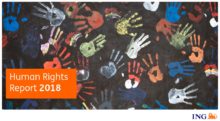ING publishes the Human Rights 2018 report. ING is committed to respecting human rights and critically reviewed it’s own practices, resulting in the first Human Rights report.
Did you know that about 40.3 million people were trapped in modern slavery in 2016? Or that hundreds of millions of people suffer from discrimination at work?
Sadly, human rights violations are still present in today’s world. This not only harms people, but has wider social and economic consequences. ING is committed to respecting human rights and critically reviewed our own practices, resulting in our first Human Rights report.
In the report, we take a look at five human rights issues. For ING as an employer, these are work-related stress and discrimination; as a corporate lender, these are land-related community issues, child labour and forced labour. Knowing the biggest risk to our people and the people in the supply chains that we finance, (known as ‘salient’ issues) means we can start managing them first.
ING measures how we are doing based on employee wellbeing, our interactions with clients, the environmental and social risk (ESR) cases we address, and potential controversies, for example. We’ve seen we can do better when it comes to tracking how frequently the salient issues come up and how we prioritise these issues. This is true for our own operations as well as those of our clients.
Doing this better will enhance our ability to assess whether our approach is successfully reducing the most severe impacts on people.
Taking action
We seek to embed human rights due diligence in to the fabric of our business. This will be a major challenge in the years ahead, but we have actions in place for continued improvement:
- We are updating our ESR sector policies.
- We plan to take action to extend opportunities for client engagement on human rights, including for the salient issues identified.
This report is a landmark for how we communicate about managing human rights. It allows us to share insights clearly and obtain feedback on how we can further improve. We aim to continue this transparency, with this first human rights report acting as a starting point for future disclosures on our performance.




